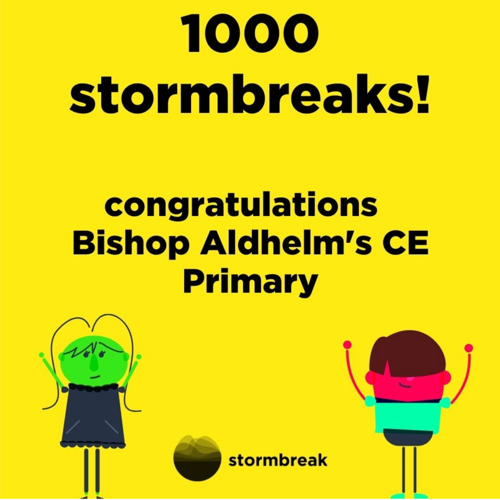Supporting children’s mental health through movement
Poole Primary school first to deliver 1000 stormbreaks to children

“The impact of stormbreak is huge. Implementing stormbreak is having such a positive impact on our children’s wellbeing and mental health. The level of emotional need, even through Covid, has reduced”
- Lizzie Sharpe, Deputy Headteacher at Bishop Aldhelm's CE Primary, Poole.
A primary school in Poole, Dorset, is the first to deliver over 1000 mentally healthy movement activity sessions, known as ‘stormbreaks’, to pupils.
With one in six children aged between six and sixteen now suffering from a diagnosable mental health condition, (NHS data: March, 2021), The House of Commons Health and social care committee report on children and young people’s mental health published in December 2021 described the need for intervention and support for the wellbeing of children. While many may have noted the impact of the pandemic on mental health and subsequent waiting times for interventions, the issue was already being captured by NHS data in 2017 and concerns have continued to rise (NHS, 2021).
Stormbreak is a mental health charity that supports primary aged children’s emotional wellbeing and mental health through movement. Stormbreak offers a preventative, universal approach through movement to support children’s mental and emotional health and wellbeing.
After starting the stormbreak journey in January 2019, Bishop Aldhelm’s CE primary now delivers a stormbreak to every child, every day across the school including throughout the challenges of home learning, virtual classes and the disruptions of lockdowns and school closures throughout the Covid-19 pandemic. Teachers and wider school staff ensured a momentum of delivery of stormbreak, seeing the positive impact on pupils throughout the challenges faced by schools in the last two years. Deputy headteacher Lizzie Sharpe has championed the programme since joining as a pilot school after reading about it online.
Starting by timetabling specific stormbreak activity slots to ensure coverage of the programme across the school, Lizzie was able to support staff to include the programme in an already busy curriculum.
Stormbreak activities are based around five key mental health concepts: resilience, self care, relationships, self worth and hope and optimism. Stormbreak aims to reduce the stigma around mental health by equipping children with language and skills that allow them to recognise, respond and regulate their feelings from as early as Reception (four years of age).
Lizzie explains:
“The main impact we’ve seen is our children’s ability to articulate how they are feeling using really specific emotion words to talk about their feelings and their wellbeing, and also being proactive about how they are feeling”
With Bishop Aldhelm’s stormbreak journey beginning pre-Covid, much cohesion between staff was required to keep giving children access to stormbreak activities every day, perhaps at the time they needed it the most. Staff included stormbreak website links in home learning instructions when children were working virtually, delivered ‘live’ stormbreaks across virtual/online assemblies and demonstrated their commitment to stormbreak by creating their own stormbreak videos for the website for children to access when they needed them. Lizzie recalls a time when up to 500 pupils would be taking part in a whole-school stormbreak at home during lockdown as a particularly powerful moment that demonstrated how far the school had come.
There are currently 72 active stormbreak schools registered and taking part in regular mentally healthy movement. As a pioneering stormbreak school, Bishop Aldhelm’s creates a culture in which stormbreak is part of everyday learning for pupils. From children celebrating stormbreak milestones such as number of activities completed, to regular updates in the school newsletter, Lizzie comments that having the whole school on board creates many opportunities for children to access movement activities that support their mental and emotional health, even outside of the classroom.
“For children with additional needs such as autism, break times and lunchtimes can be overwhelming and quite difficult as a free-flowing activity… stormbreak (led by a member of staff) is a structured activity that lets them move around. Something they are familiar with makes break times more purposeful”
The next step for Bishop Aldhelm’s will be to take part in the new ‘Stormbreak Champion’ programme in which older children in Year 5 will deliver their own stormbreak activities with younger children. As the pupils have had stormbreak embedded in their learning for up to three years, it’s an exciting time for the school staff to share some responsibility for delivery with pupils. Younger children are also demonstrating leadership of their stormbreak journey through the use of a stormbreak register, in which children choose a mental health concept they would like to focus on each day.
“A powerful example of this was in Year Two recently,” comments Lizzie. “Lots of children chose ‘resilience’ and told their teacher that it was because they found it hard to get on with their work now that they’re not as used to being at school”
Lizzie adds:
“We’re really proud to be the first school to hit 1000 stormbreaks. We told the children in our assembly and there were cheers going down the corridor because they know they’re been part of something as well, and they see and feel the difference it’s made”
“It’s so exciting to see the real impact that stormbreak is having on the lives of children and the culture of a school. At a time when children, teachers and schools need support we’re pleased that stormbreak has been able to help wellbeing and mental health. We’re so proud of Bishop Aldhelms, the staff and children”.
-Dr Martin Yelling, founder and CEO of stormbreak
You can get involved with stormbreak by signing up for a FREE account to watch, take part in and log stormbreaks at home. If you are interested in becoming a stormbreak school, please email hello@stormbreak.org.uk
Bishop Aldhelm's were one of the first schools to take part in the Surge programme with stormbreak. Find out more about Surge here.
Bishop Aldhelm's CE Primary School features stormbreak on their school website. See the website here.

